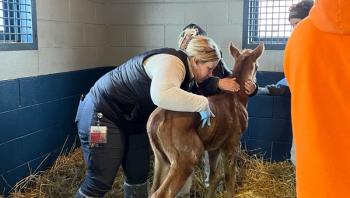
Institute of Medicine commits to One Health study at summit
The crowning achievement at the One Health Commission's first summit was the decision that the Institute of Medicine will conduct a study to act as a road map for the organization
Washington — The crowning achievement at the One Health Commission's first summit was the decision that the Institute of Medicine will conduct a study to act as a road map for the organization.
While the Institute of Medicine is trying to secure funding for the 16- to 18-month study, officials hope to launch it in early 2010.
"The commitment to the concept was very evident within the participants of the summit," says One Health Commission Chief Executive Officer Roger Mahr, DVM. "They recognized the imperative of One Health for addressing the real need for the integration of animal, human, and ecosystem health, as well as the need for collaboration and leadership coming from the various disciplines."
Keynote speakers at the Nov. 17 summit, which drew about 150 leaders in the fields of science and medicine, included senior officials from the U.S. Department of Agriculture (USDA), The Ohio State University College of Veterinary Medicine (OSU), the Centers for Disease Control and Prevention (CDC), the U.S. Food and Drug Administration (FDA), and the Minnesota Department of Natural Resources. They pointed to current challenges caused by H1N1 and zoonotic diseases as the driving force behind the establishment of the One Health Commission.
"These viruses highlight the fact that animals and people are linked," says Doug O'Brien, USDA's senior adviser to the secretary. "USDA and the veterinary community have a rich history of applying veterinary principles to protect human health. Our approach has been broad and recognizes the importance of controlling certain human diseases at their source, which is sometimes animals."
USDA created its own One Health Joint Working group to address health concerns shared among people, animals, and the environment since many agree those groups are interrelated.
"It's impossible to consider animal and human health separately," says Dr. Joshua Sharstein, principal deputy commissioner of the FDA.
Additionally, Dr. Lonnie King, dean of OSU, said leaders need to shift their schools of thought from surveillance of emerging diseases to prevention and intervention.
Greater disease detection in humans starts at the animal level, adds Rear Admiral Ali Khan, acting director of the National Center for Zoonotic, Vector-Borne, and Enteric Diseases at the CDC. He outlined greater leadership, investment, integration, research, and respectful partnerships between healthcare leaders as the five key steps for the success of the One Health Commission.
Newsletter
From exam room tips to practice management insights, get trusted veterinary news delivered straight to your inbox—subscribe to dvm360.






